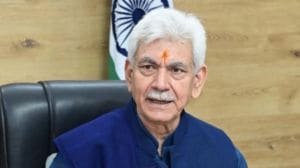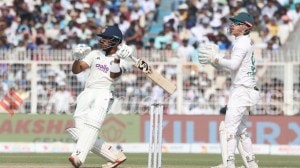THE US trade team led by Assistant US Trade Representative for South and Central Asia Brendan Lynch was scheduled to land in New Delhi late Monday evening, and is set to engage with commerce ministry officials on Tuesday.
In what will be the first in-person talks between the two countries after the high stakes negotiations for a trade deal broke down, officials in New Delhi said the US team is likely to be here for only a day.

The talks between India and the US hit a pause after the US imposed an additional 25% tariffs effective August 27 on New Delhi for purchasing Russian oil, in addition to the 25% reciprocal tariffs that became effective earlier on August 7.
Story continues below this ad
“India and the US have been engaged in talks at various levels, and the US trade team led by their chief negotiator is reaching India tonight, and we will be holding talks tomorrow to see what the future of talks will be,” India’s chief negotiator and Special Secretary in the Ministry of Commerce, Rajesh Agarwal, told reporters.
This comes after the trade ties between the two countries soured over what India said were “non-trade issues”. Officials had earlier said India and the US were at a striking distance of a trade deal, but after the US took exception to New Delhi purchasing oil from Russia, it felt this impinged on its sovereignty.
“It is not a round of negotiation. But we will try to see how we can reach an agreement with the US. We had been talking virtually but we have not made much progress because the environment was not conducive,” an official said in response to a question if the formal trade talks have resumed.
Commerce Secretary Sunil Barthwal said, “There have been discussions going through diplomatic level, on level of trade, on level of chief negotiators, on level of ministers. And on the trade front, a team of US trade negotiators would be coming to India for discussions. Further courses of action will also be discussed. But overall, there is a positive frame of mind in both countries with respect to trade issues”.
India exporters begin facing tariff heat
Story continues below this ad
The US negotiator’s visit comes at a time when the Indian exporters have begun facing a loss of business as the US importers have begun cancelling orders due to steep tariffs on India compared to other countries. While the government is working on a relief package to address the immediate liquidity challenge that exporters are facing, officials have said that there remains a difference in opinion within the government on how best to address the issue, as the exact estimate of impact remains unclear.
Meanwhile, after meeting the Finance Minister Nirmala Sitharaman, exporters met RBI Governor Sanjay Malhotra on September 11 seeking a range of support measures – from a weaker rupee, easier loan repayment terms to credit support to help diversify into other markets – to tide over the immediate stress caused by US tariffs. Exporters said that a delay in the trade deal would mean permanent loss of the US market as importers would be forced to look at other options.
Mixed signals from the US
Hinting at a possible easing of trade tensions, US President Donald Trump last week said India and America are “continuing negotiations to address the trade barriers”, and that he was “certain” there would be “no difficulty” in the talks being successful. Responding hours later, Prime Minister Narendra Modi said both countries are “natural partners” and will “work together to secure a brighter, more prosperous future”.
However, the US asked G7 countries to ramp up pressure on countries buying Russian oil, to end the war in Ukraine, as per a joint statement released by the US Department of the Treasury. The statement said the US has received “commitments” from G7 countries to increase sanctions pressure on Russian oil buyers. China and India are the top buyers of Russian oil.
India’s red line on oil & agriculture
Story continues below this ad
India has maintained that it will continue to buy Russian oil. Finance Minister Nirmala Sitharaman earlier this month said that economic and commercial considerations drive India’s oil purchases. India is the world’s third-largest consumer of crude and depends on imports to meet around 88 per cent of its requirement.
Prime Minister Narendra Modi during his Independence Day speech said India will not compromise on the well-being of Indian farmers, fisherfolk and cattle keepers. “The well-being of Indian farmers, fisherfolk and cattle keepers is our foremost priority. Modi is standing like a wall against any adverse policy that could impact Indian farmers, fisherfolk and cattle keepers,” the Prime Minister said during his Independence Day speech.
This came after demands from the US to open the Indian agricultural market to American genetically modified (GM) products that have traditionally faced resistance in the country from the farming community. Farmers have not only resisted foreign agricultural products, but they have also sought to keep agriculture out of the World Trade Organization (WTO).

































